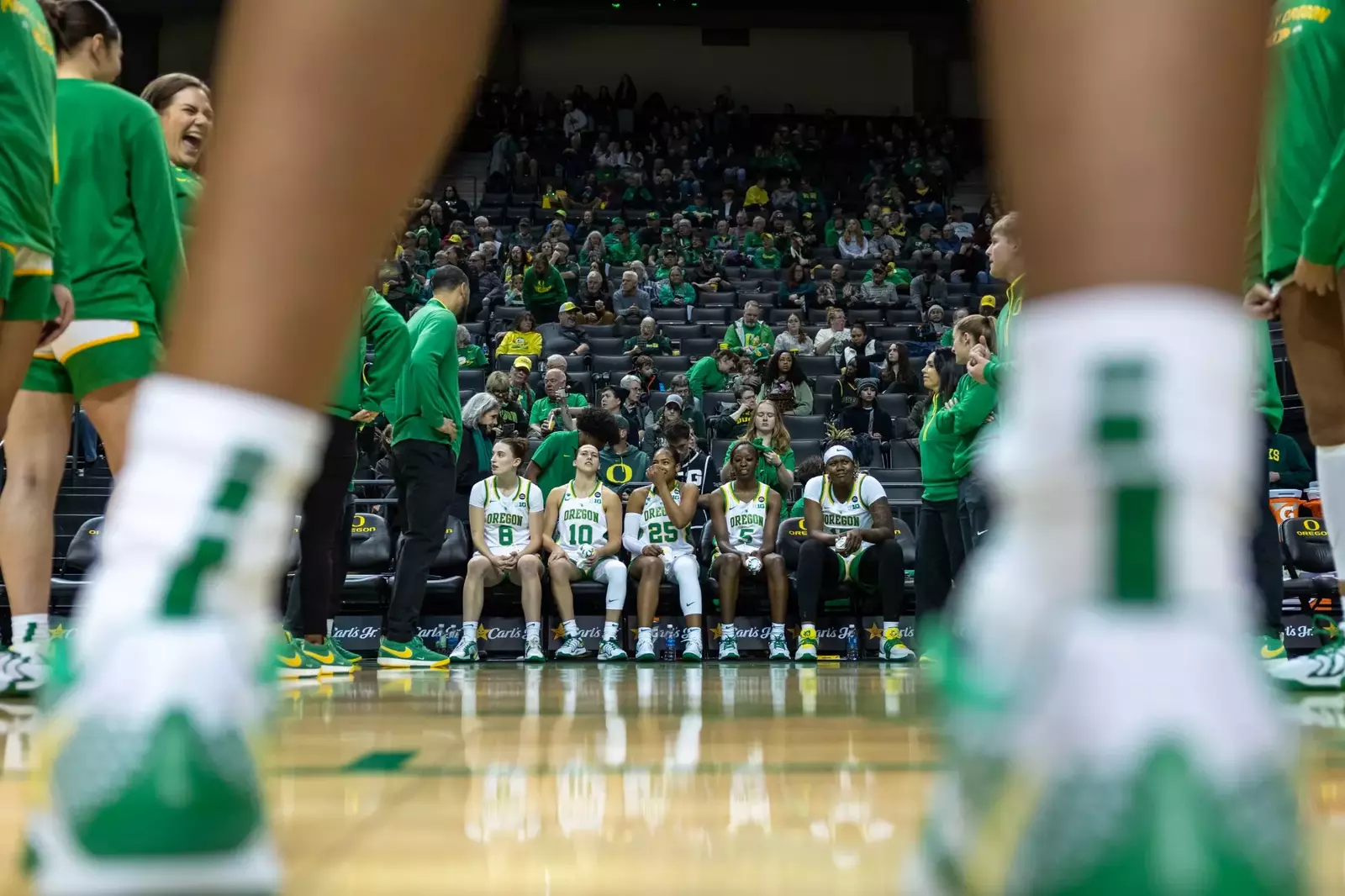EUGENE, Ore. — After a two-game swing through the state of Illinois, the Oregon women’s basketball team returns to Matthew Knight Arena to host Wisconsin on Saturday at 12:30 p.m. on Big Ten Network. Oregon looks to even its Big Ten record after its 85-65 win at Northwestern on Tuesday, its first as a member of […]


EUGENE, Ore. — After a two-game swing through the state of Illinois, the Oregon women’s basketball team returns to Matthew Knight Arena to host Wisconsin on Saturday at 12:30 p.m. on Big Ten Network.
Oregon looks to even its Big Ten record after its 85-65 win at Northwestern on Tuesday, its first as a member of the Big Ten. Wisconsin also sits at 1-2 in Big Ten play after the Badgers dropped two games last week, a road loss to Indiana before a home setback to Minnesota on New Year’s Eve.
The teams will meet for the fourth time ever, and the first since the 2009-10 season. The Badgers lead the all-time series 2-1, including a 58-57 win in Eugene in the last meeting between the teams.
GAME #15
Oregon (10-4, 1-2) vs. Wisconsin (10-4, 1-2)
Saturday, Jan. 4 | 12:30 p.m. | Matthew Knight Arena (Eugene, Ore.)
TV: Big Ten Network
Play-by-play: AJ Kanell | Analyst: Elise Woodward
Radio: Oregon Sports Network (KUGN 98.1 FM/590 AM)
Play-by-play: Chris Clayton | Analyst: Bev Smith
Listen Online | Live Stats |Tickets
LAST TIME OUT
Oregon picked up its first conference win as a member of the Big Ten Conference on Tuesday, earning an 85-65 win at Northwestern. With a left-handed layin in the first quarter, Deja Kelly became the 10th active player to reach 2,000 career points.
Five Ducks turned in double-digit points, and seven finished with at least nine. It marked the first time since March 17, 2023 against North Dakota State that five Ducks turned in 10 or more points. The UO bench chipped in 46 points, the third time over the last four games in which the reserves outscored the starters.
Kelly matched her career high with eight assists and grabbed four rebounds while not committing a turnover. As a team, the Ducks dished out 25 assists on 33 made field goals, their second-highest assist total of the year.
SCOUTING WISCONSIN
Wisconsin (10-4, 1-2) went 0-2 last week, falling at Indiana 83-52 on Dec. 28 followed by a 59-50 home setback to Minnesota on New Year’s Eve. The pair of losses snapped five straight wins, including a home win over Rutgers to open Big Ten play.
The Badgers are led by Serah Williams and her 19.2 points and 12.1 rebounds per game. Williams leads the Big Ten in rebounding while ranking fourth in scoring. Williams has led UW in scoring 10 times and rebounding 11 times this season, while her 10 double-doubles paces the conference and ranks third nationally.
Ronnie Porter (10.8 PPG) and Carter McCray (10.5) round out three players averaging double-digit points. Porter is fourth in the league with 4.9 assists a game and boasts a 2.56 assist-to-turnover ratio (No. 3 in the Big Ten).
As a team, Wisconsin ranks sixth in the conference in defensive rebounds per game with 27.5 and turnovers per game at 13.9. The Badgers rank last in the Big Ten at forcing turnovers, forcing 11.8 a game while also ranking last in bench points per game at 12.4.
INSIDE THE SERIES
Oregon and Wisconsin will meet for just the fourth time in program history on Saturday, and the first as members of the Big Ten Conference. The Badgers lead the all-time series 2-1, dating back to 1996. The teams last met back in 2009, with Wisconsin coming away with a one-point victory, 58-57, in Eugene. The Ducks earned a 71-57 victory in 2000 for their lone win in the series history.
DUCK DEPTH
Oregon’s depth, helped by seven transfers among nine newcomers, has keyed the Ducks’ 10-4 start this season. Six different players have led (or tied) UO in scoring through 14 games, including three off the bench in Nani Falatea, Katie Fiso and Elisa Mevius. The Oregon bench is averaging 31.9 points per game and has outscored its opponents’ bench 447-223 on the season, an average of 16.0 points a game. Last year, UO averaged just 9.6 points a night from its bench and opponents outscored the Ducks’ bench by 288 points.
» After Oregon’s bench scored 46 points at Northwestern, the Ducks’ bench has outscored the starting five in three of its last four games.
» Over the last four games, the reserves have accounted for 174 of Oregon’s 318 total points (54.7 percent) and averaged 43.5 points a game in that span.
» Five players finished in double figures at Northwestern, including three off the bench in Falatea (13), Alexis Whitfield (11) and Ehis Etute (10), while seven players turned in at least nine points in the win.
» UO’s bench has outscored its opponents in all but one game this season, and nine times by double digits.
» The Ducks dropped a season-high 51 bench points on Air Force on Dec. 17, the most points scored by the bench since scoring 58 against Seattle U on Nov. 28, 2020.
» Ten players finished with at least eight points against the Falcons, with four scoring in double figures, while six handed out multiple assists and seven recorded multiple steals.
» The Ducks followed that up by scoring 48 bench points in their win over UC Irvine, combining for 99 points in a two-game stretch – their most in any two-game span on record.
» Nine players are averaging at least 5.0 points per game, including three bench players, with Falatea leading the bench scoring at 7.4 points per game.
» The Oregon bench has scored at least 20 points 12 times, and five times eclipsed the 40-point plateau. Last year, UO’s single-game bench high was 26 points while surpassing 20 points just twice.
» The Ducks have been led in rebounding by six different players, five of which are newcomers, this season. Deja Kelly, Phillipina Kyei and Amina Muhammad are the only players to lead the team in rebounding in multiple games.
» Head coach Kelly Graves has utilized six different starting lineups this season, with three Ducks making their first starts of the year against South Dakota State: Ehis Etute, Nani Falatea and Sarah Rambus.
DUCK DEFENSE
Oregon has made life difficult for its opponents on the offensive end this season. The Ducks defense has registered double-digit steals in five of its last seven games, and in seven of its last 11 games, including a season-high 17 coming against Air Force on Dec. 17. Additionally, UO is allowing opponents to shoot just 27.5 percent from beyond the arc, and has allowed only four teams to shoot over 30.0 percent (Auburn, South Dakota State, Washington State, USC). UO allowed North Texas and Grand Canyon to shoot a combined 7-of-30 from deep over a two-game stretch (Nov. 12-18).
» Through four Big Ten games, Oregon is holding opponents to 26.9 percent shooting from 3-point range – the fourth-lowest rate in the conference.
» With 10 or more steals in six of their last nine games, the Ducks have eight games this season with double-digit steals after turning in only two such games last season and seven times in 2022-23.
» The Ducks recorded 10-plus steals in five straight games from Nov. 26-Dec. 19, their longest streak since putting together seven straight games with 10 or more steals in 2013-14.
» On the season, Oregon is averaging 10.1 steals a game this season (fifth in the Big Ten). It would mark the most on a per-game basis since averaging 10.2 in 2013-14.
» The Ducks have forced opponents into 20 or more turnovers six times this season, including in three of their last five games. The six such games are already the most since doing so seven times in 2019-20.
» UO had just one game forcing 20 or more turnovers last season and five such games in 2022-23.
» UO forced both USC and Illinois into 22 turnovers and is averaging 19.3 turnovers forced per game in Big Ten play, the third-highest rate in the league.
» The Ducks forced a season-high 29 turnovers against Air Force on Dec. 17, marking the most forced turnovers since forcing 29 against CSUN on Nov. 19, 2017.
» On the season, Oregon’s defense is forcing teams into 18.6 turnovers per game, good for sixth in the Big Ten, while owning a plus-4.79 turnover margin, which is fifth-best in the league.
» Oregon has finished with fewer or the same number of turnovers 12 times this season, and has committed fewer turnovers than its opponent in nine straight games.
COMES AS SET, DO NOT SEPARATE
Graduate guard Deja Kelly was the most recent player to join the 2,000-point club, as she achieved the milestone on New Year’s Eve at Northwestern. Kelly joined teammate Peyton Scott, who scored her 2,000th career point on Dec. 19, in the elite club. Scott became the eighth active player in the 2K Club while Kelly is the 10th to score 2,000 career points.
Kelly, a graduate transfer from North Carolina, amassed 1,858 career points over four seasons (121 games) as a Tar Heel while Scott tallied 1,873 points in 112 career games in four years at Miami (Ohio). Scott is now in her sixth collegiate season after receiving a medical hardship waiver due to her season-ending knee injury suffered in the 2023-24 season opener.
» Scott entered the season No. 7 among active players in career points, while Kelly was next at eighth.
» As of Thursday, Scott sits in eighth at 2,026 points with Kelly only 19 points behind in 10th.
» The duo is the only set of teammates in the top 10 in scoring among active players, and the pair sits as the top two players in the Big Ten in career points.
» Both Kelly and Scott lead the team with seven double-digit scoring games, while both have 102 career games in double figures. Kelly has surpassed the 20-point plateau three times this season and Scott once.
» Kelly has authored 102 career games in double figures with Scott only one game behind, while Scott has 37 career 20-point games to Kelly’s 35.
KEYS TO VICTORY
In all 10 wins this season, Oregon has produced more rebounds than its opponents while being outrebounded in each of its four losses. In victories, the Ducks average 9.7 more rebounds than their opponents while being outrebounded by an average of 14.8 rebounds a game in defeats.
» Oregon is 10-0 this season when leading or tied at halftime and 0-4 when trailing after 20 minutes of play.
» The Ducks are 10-2 when finishing with more or the same number of assists this season, averaging 19.4 assists a game in wins compared to 9.8 in losses.
» UO is 8-3 when committing fewer turnovers than its opponent, averaging 13.2 turnovers a game in wins.
» The Ducks are 10-1 when scoring at least 60 points and 9-1 when scoring 70 or more points. The Oregon offense averages 79.0 points per game over its 10 wins compared to 60.0 points in its four losses.
» In losses, UO averages just 27.3 first-half points while allowing 34.3 in first halves.
» In victories, the Ducks put up an average of 37.5 points in the first half and 41.5 in second havles, while allowing only 23.7 first-half points and 32.9 in the second halves of games.
» Nine players average at least 6.0 points per game over UO’s 10 wins, while only four Ducks average over 6.0 points a game in defeats.














